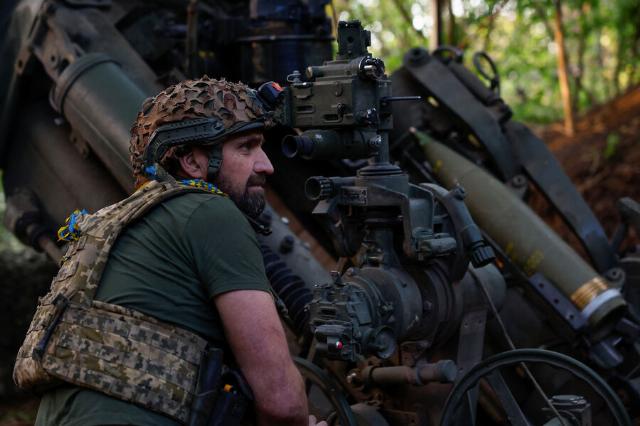Colonel Khodarenok: Western statements on Ukraine speak of disbelief in the victory of the Armed Forces of Ukraine
In the event of the defeat of Ukraine, the United States may have to intervene in the conflict by involving its troops. This is the opinion of the leader of the Democratic minority in the House of Representatives of the US Congress, Hakim Jeffries. What these statements say and why Western countries no longer believe in the exit of the Ukrainian army to the borders of 1991, the military observer of the Newspaper understood.En" Mikhail Khodarenok.
The leader of the Democratic Party in the House of Representatives of the US Congress, Hakim Jeffries, did not rule out that the United States would have to send units and formations of its armed forces to Ukraine in case of severe defeats of the Armed Forces of Ukraine.
It should be noted that there is still a slight contradiction between the words of American lawmakers and the latest actions of the US authorities. The House of Representatives of the US Congress has just passed a bill on assistance to Ukraine for $60.8 billion. First of all, the Armed Forces of Ukraine will receive anti-aircraft guided missiles, ATACMS long-range missiles, ammunition for barrel artillery, armored vehicles, anti-tank missile systems, etc.
It would seem that there is more than a solid package of military assistance that will help stabilize the situation on the fronts. And suddenly there is such disbelief in the combat capabilities of the Armed Forces of Ukraine: the United States will have to send its troops to Ukraine in the event of the defeat of Kiev. It turns out that they didn't give enough?
French President Emmanuel Macron has once again stated that he does not rule out sending military personnel to Ukraine. "If the Russians had broken through the front line, if Ukraine had received a request - which is not the case today - we would have legitimate reasons to ask ourselves this question about sending troops," the French head of state added on this occasion.
And here again we see great doubts, now from the French president, whether Ukraine will hold the front in the near future.
It should be noted that yesterday Macron significantly adjusted his position on sending troops. "France is not at war with either Russia or the Russian people," he stressed.
NATO's "Red Lines"
The North Atlantic Alliance has also joined the analysis of the situation in the zone of its own. As the Italian newspaper Repubblica wrote, NATO countries have established two "red lines" in a "confidential form", at the intersection of which direct intervention of the North Atlantic Alliance in the conflict in Ukraine is possible.
The first "red line" concerns the threat of Russia breaking through the defense line of Ukraine and the participation of a third country in the conflict, namely Belarus. According to the article, the Armed Forces of Ukraine cannot fully control the border with Belarus, and this creates conditions for a breakthrough of the Armed Forces of the Russian Federation.
The second "red line" is a possible provocation by Russia against the Baltic States, Poland or a "targeted attack on Moldova."
Two remarks should be made about the first "red line". First, now we are seeing doubts in NATO whether Ukraine will hold the front. Secondly, the President of Belarus, Alexander Lukashenko, is doing everything possible (and impossible too) not to enter into conflict in Ukraine under any circumstances. And it can be seen with the naked eye. But this seems to be unnoticed by NATO headquarters.
The second "red line" drawn by the North Atlantic Alliance, where we are talking about "Russia's provocation against the Baltic States, Poland or a targeted attack on Moldova", should be classified as outright nonsense and regarded as an obvious demonstration of the complete absence of any sober analysis of the military-political situation.
And for NATO, the question remains relevant - how is it that the member states of the North Atlantic Alliance supply Ukraine with ever-increasing amounts of weapons, military and special equipment, and at the same time there is such disbelief in the combat and operational capabilities of the Armed Forces in Brussels.
By definition, there is no talk of any upcoming victories of the Ukrainian army in such assessments.
Finally, the Armed Forces of the Russian Federation, on behalf of the Supreme Commander-in-Chief, President Vladimir Putin, will conduct unscheduled exercises on the use of non-strategic nuclear weapons. The exercises will be held "in response to provocative statements and threats by certain Western officials" against Russia.
Such an event should be considered as the best means to cool the hotheads in the West and stop discussions about the possible dispatch of military contingents of their national armed forces to the zone of military operation.
The opinion of the author may not coincide with the position of the editorial board.
Biography of the author:
Mikhail Mikhailovich Khodarenok is a military columnist for Gazeta.Ru", retired colonel.
He graduated from the Minsk Higher Engineering Anti-Aircraft Missile School (1976), the Military Air Defense Command Academy (1986).
Commander of the S-75 anti-aircraft missile division (1980-1983).
Deputy commander of the anti-aircraft missile regiment (1986-1988).
Senior Officer of the General Staff of the Air Defense Forces (1988-1992).
Officer of the Main Operational Directorate of the General Staff (1992-2000).
Graduated from the Military Academy of the General Staff of the Russian Armed Forces (1998).
Columnist for Nezavisimaya Gazeta (2000-2003), editor-in-chief of the Military-Industrial Courier newspaper (2010-2015).
Mikhail Khodarenok

